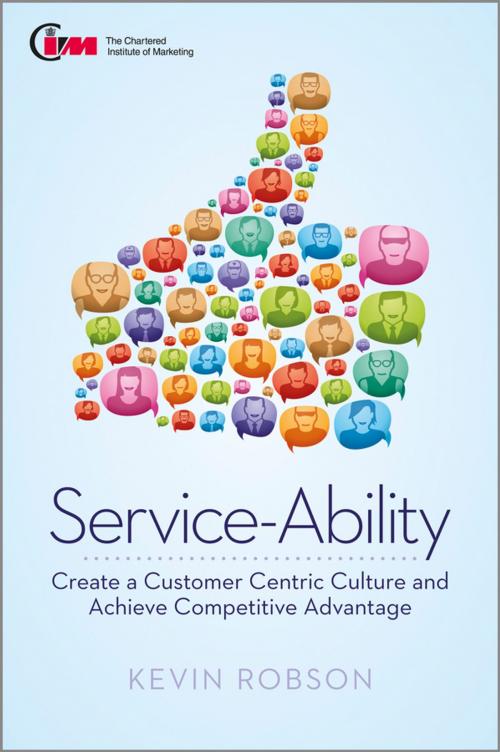Service-Ability
Create a Customer Centric Culture and Achieve Competitive Advantage
Business & Finance, Management & Leadership, Leadership| Author: | Kevin Robson | ISBN: | 9781118457856 |
| Publisher: | Wiley | Publication: | November 12, 2012 |
| Imprint: | Wiley | Language: | English |
| Author: | Kevin Robson |
| ISBN: | 9781118457856 |
| Publisher: | Wiley |
| Publication: | November 12, 2012 |
| Imprint: | Wiley |
| Language: | English |
Times have changed.
Long gone are our days of being kings of the manufacturing industry, we are now immersed in the world of ‘service’ where the relationship between an organization and the customer is an integral part of the "product" offering. The nation is suffering from a widespread lack of truly customer-satisfying service. We lack the very thing that we need to make this new paradigm work efficiently: service-ability.
Organizations of all kinds are facing high customer churn, serious customer antagonism, loss of consumer confidence and plummeting customer satisfaction. Research shows that totally satisfying the customer is the only thing that will secure loyalty and offer significant competitive advantage. Yet still, on a daily basis we encounter service that frustrates us.
Whilst the emergence of technology has no doubt brought efficiency to many areas of business activity, including the third sector, it has led to the standardised and indifferent service we regularly receive. We appear to have lost sight that people do business with people. Through efficient technology, our organisations may be serviceable but they are not service able.
The arrival of Generation Y and the developments in social media, provide businesses with a whole new way to engage with their customers, but also provide a new way for customers to rate companies, products and services: not always in a positive manner. ‘Like’ or ‘#Fail’ have become part of our social language.
Organizations that refocus on the need to treat customers in a way that satisfies them, and not the technology, will have better customer retention, lower costs of replacement and will build their brand value through better reputations.
Service-Ability delves deeply into these areas to show how today's managers need to re-think the way we structure, manage, lead and organize our companies to achieve total ‘customer-centric’ work cultures that develop lasting relationships with customers.
Times have changed.
Long gone are our days of being kings of the manufacturing industry, we are now immersed in the world of ‘service’ where the relationship between an organization and the customer is an integral part of the "product" offering. The nation is suffering from a widespread lack of truly customer-satisfying service. We lack the very thing that we need to make this new paradigm work efficiently: service-ability.
Organizations of all kinds are facing high customer churn, serious customer antagonism, loss of consumer confidence and plummeting customer satisfaction. Research shows that totally satisfying the customer is the only thing that will secure loyalty and offer significant competitive advantage. Yet still, on a daily basis we encounter service that frustrates us.
Whilst the emergence of technology has no doubt brought efficiency to many areas of business activity, including the third sector, it has led to the standardised and indifferent service we regularly receive. We appear to have lost sight that people do business with people. Through efficient technology, our organisations may be serviceable but they are not service able.
The arrival of Generation Y and the developments in social media, provide businesses with a whole new way to engage with their customers, but also provide a new way for customers to rate companies, products and services: not always in a positive manner. ‘Like’ or ‘#Fail’ have become part of our social language.
Organizations that refocus on the need to treat customers in a way that satisfies them, and not the technology, will have better customer retention, lower costs of replacement and will build their brand value through better reputations.
Service-Ability delves deeply into these areas to show how today's managers need to re-think the way we structure, manage, lead and organize our companies to achieve total ‘customer-centric’ work cultures that develop lasting relationships with customers.















